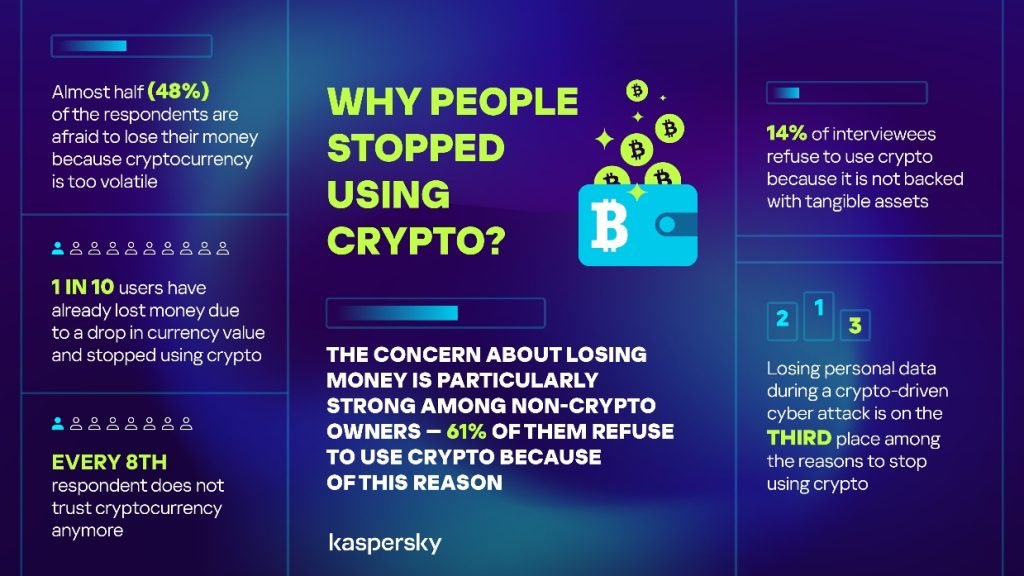According to Kaspersky’s latest survey (quantitative global online research with 12,000 people from 16 countries including Austria, Brazil, Colombia, France, Germany, India, Malaysia, Mexico, Saudi Arabia, South Africa, Spain, Switzerland, Turkey, UAE, the UK, and the USA) on the prevailing trends in the cryptocurrency space, almost half (48%) of users fear losing money due to instability and therefore no longer use cryptocurrencies.
Furthermore, 10% of respondents said that they have already lost money and have therefore stopped investing.
The recent market downturn in 2022, combined with ongoing malicious activity, has led to a liquidity crisis and caused uncertainty for many cryptocurrency owners about their investments.
These challenges are scaring digital currency holders, with some shying away from investing or even leaving the space altogether.
Such trends are included among the main factors due to which some cryptocurrency enthusiasts have stopped using digital currencies, according to the findings of Kaspersky’s latest research.
Instability is a major barrier to wider adoption of cryptocurrencies
In fact, 48% of respondents said they are afraid to use cryptocurrencies because they don’t want to risk losing their money. Unfortunately, 10% of respondents had already suffered losses due to the drop in the value of cryptocurrencies.
Concerns about losing money due to currency volatility are also raised by those who do not hold cryptocurrencies. A whopping 61% of those who do not hold cryptocurrencies said they refuse to use them because they are worried about their money.

The lack of physical infrastructure to support cryptocurrencies (14%) and the risk of personal data being exposed during a cyber-attack (6%) are further barriers to adopting their use.
These findings suggest that stability and security are key factors for wider adoption of cryptocurrencies. In fact, one in eight respondents no longer trust cryptocurrencies at all.
The picture is mixed in terms of user responses. In the Asia-Pacific region, 41% of respondents said that their expectations have been met, while 35% said that this was not the case for them.
However, in Europe, where there was the highest percentage of users who regretted investing in cryptocurrencies, 41% of respondents said that their expectations were only met to some extent or not at all.
This compares to just 26% who said their hopes from cryptocurrencies were fulfilled.
“Despite the challenges currently facing the cryptocurrency market, it is important to remember that it is still a relatively new and innovative space with huge potential. As with any emerging technology, there will be disappointments and setbacks, but the long-term outlook for cryptocurrencies remains promising. By prioritizing security, cryptocurrency enthusiasts can minimize the risk of losing money or personal information and protect themselves from cryptocurrency-related threats,” according to Marc Rivero, Senior Security Researcher in Kaspersky’s Global Research and Analysis Group.
To maximize the benefits of secure cryptocurrency use, Kaspersky experts also recommend:
- Use strong and unique passwords: creating strong and unique passwords for each of your cryptocurrency accounts can help prevent password breaches and brute force attacks.
- Avoid phishing attacks: be wary of suspicious emails or links and always check the URL before entering your login details.
- Do not share your private keys: Your private keys unlock your cryptocurrency wallet. Keep them private and never share them with anyone.
- Stay up to date on the latest cyber threats and best practices for keeping your cryptocurrency safe. The more you know about protecting yourself, the better equipped you will be to prevent cyber attacks. For businesses, when choosing an awareness seminar for your employees, make sure the training program includes information on cryptocurrency security.
- Use security solutions: A reliable security solution will protect your devices from various types of threats. Kaspersky’s portfolio prevents all known and unknown cryptocurrency scams, as well as the unauthorized use of your computer’s processing power for cryptocurrency mining.
Previous Articles:
- Summer of Bitcoin program returns for 2023, offering education and incentives for Bitcoin developers
- Gensler Urges Investors to Beware of FOMO, Warns of High Speculation in Crypto Space
- Iran and Russia Collaborating on Gold-Backed Cryptocurrency
- Anthony Scaramucci: 2023 is a ‘Bounce-Back Year’ for Bitcoin, Predicts $100,000 Levels in Next 2-3 Years
- Robert Kiyosaki: Bitcoin, gold, silver and oil are good news for those who know that inflation is permanent
